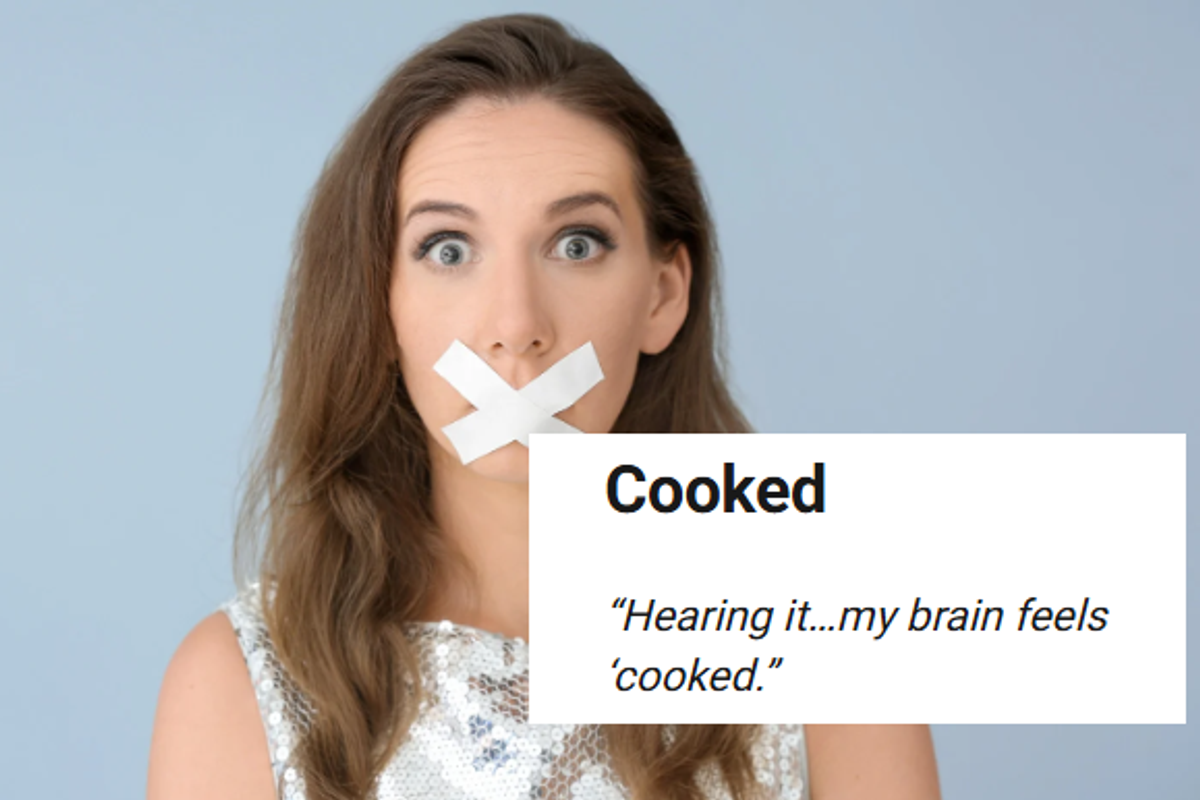For the 50th year in a row, a group of linguists chose 10 English words that need to be banned
Some of it is Gen Z slang, but Gen Xers and Millennials took a hit, too.
A woman has tape over her mouth.
Words can go in and out of fashion, just like clothing, music taste, and hairstyles. A phrase may start out funny or clever, but overuse will render it meaningless, cringe-inducing, and most likely, annoying.
A recent example is “6-7,” a verbal meme popularized in schoolyards that quickly evolved into a popular 2025 Halloween costume for parents and is now one of the most grating phrases. It even has an accompanying singsong delivery that one can hear just by reading it.
The good news is that, in cases where some phrases are overused, a group of linguists at Lake Superior State University (LSSU) has maintained a Banned Words List for the past 50 years, a tradition that highlights the “importance and evolution of language.” This year, over 1400 words were submitted to LSSU from all 50 states and as far away as Uzbekistan. The linguists selected 10 words this year for banishment and added a rationale for each selection. Number one should not come as a shock to anyone.
@vipervm5 The “6-7” meme kid that started it all #67 #67kid #sixseven #meme #viral
LSSU's list of banned words for 2026
6-7
“There are six or seven reasons why this phrase needs to be stopped,” says Paul E. from WI. The volume of submissions for this one could have taken up the whole list, or at least slots 6-7. The top banishment this year, Scott T. from UT, adds, “it’s time for '6-7' to be 86’ed.”
Demure
“It’s very said more than very done, and we’re all very done hearing it!” remarks Tammy S. Often used in the phrase ‘very demure, very mindful,’ Madison C. shares that the overuse “waters down the real meaning.”
“Demure” took off in popularity in 2024 after TikTok influencer Jools Lebron discussed how her makeup and hair were very modest, respectful, and understated when she goes to work. "See how I do my makeup for work? Very demure, very mindful,” she says in the TikTok video with over 56 million views.
The word would go on to become 2024's Word of the Year for Dictionary.com.
@joolieannie #fyp #demure
Cooked
“Hearing it…my brain feels ‘cooked,” groans Zac A. from VA. Parents and guardians led the charge on this one, but some felt it wasn’t enough. James C. from WA suggests a ban of “all forms of the word cook,” hoping that hearing them will become rare.
Massive
“Way overused! (often incorrectly),” exclaim Don and Gail K. from MN. This word’s massive overuse has secured its place on this year’s list.
Incentivize
In the longstanding effort to turn nouns into verbs, this is another culprit. Two separate submissions likened hearing this word to “nails on a chalkboard.” Patricia from TX asks, “What’s wrong with motivate?”

Full stop
“For the same reason ‘period’ was banished…redundant punctuation,” explains Marybeth A. from OR.
Perfect
“There are very few instances when the word actually applies,” notes Jo H. from CA. Often heard during customer service interactions, Char S. from OH wonders: “How do they know it’s perfect…what does that mean?”
Gifted (as a verb)
“I found this on the 1994 list, but it will make me feel better to recommend that it be included once again,” reveals James S. from OK. Another case of a noun being used as a verb.
My Bad
In the 1998 banishment, Elizabeth P. from MI suggested, “students and adults sound infantile when using this to apologize.” The phrase hasn’t matured in credibility since then. Andrea R. from OH shared, “It does not convey much meaning in the way of an apology.”
Although no one is 100% sure where the phrase “my bad” originated, some say it started with 7’7” Sudanese basketball player Manute Bol. Instead of saying my fault after an errant pass, he’d say “my bad.” This caught on like wildfire, and no one has been able to put it out.
Manute Bol 7'7 standing next to Muggsy Bogues 5'3. pic.twitter.com/NGZ1Fd0wzL
— Flippy (@sillyflippy) May 29, 2024
Reach Out
First banished in 1994, this saying has strayed from the positive message it once intended to deliver. “What started as a phrase with emotional support overtones has now become absurdly overused,” asserts Kevin B. from the United Kingdom.
LSSU has spoken with their 10 worlds that should be banished for 2026, but after 50 years, their work will never cease. Once we ban another 10 phrases, 10 more will surely show up this year, starting as clever but eventually annoying the heck out of us. Be vigilant, folks, and if you find any words that need to be banned, be sure to send them to LSSU for next year’s list.

